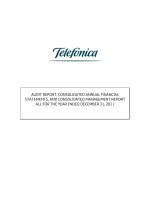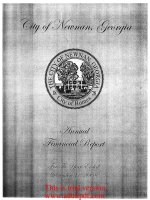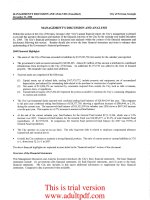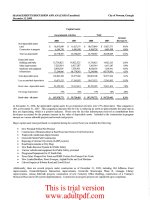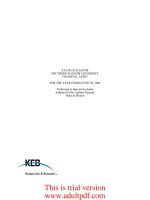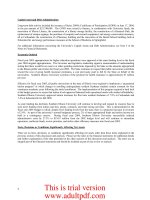NESHOBA COUNTY Combined Statement of Revenues, Expenditures and Changes in Fund Balances All Governmental Fund Types For the Year Ended September 30, 1997_part1 docx
Bạn đang xem bản rút gọn của tài liệu. Xem và tải ngay bản đầy đủ của tài liệu tại đây (46.45 KB, 11 trang )
8
NESHOBA COUNTY Exhibit B
Combined Statement of Revenues, Expenditures and Changes in Fund Balances -
All Governmental Fund Types
For the Year Ended September 30, 1997
Totals
Governmental Memorandum
Fund Types Only
Special Debt Capital Primary
General Revenue Service Projects Government
Revenues
Property taxes $ 2,139,060 941,633 734,336 3,815,029
Licenses, commissions and
other revenue 202,806 272,860 475,666
Fines and forfeitures 330,667 330,667
Intergovernmental revenues:
Federal sources 50,617 80,545 131,162
State and local sources 704,413 794,614 1,499,027
Charges for services 194,016 197,564 391,580
Use of money and property 33,743 52,717 9,522 146,001 241,983
Miscellaneous revenues 24,635 6,133 30,768
Total Revenues 3,679,957 2,346,066 743,858 146,001 6,915,882
Expenditures
Current:
General government 1,496,650 4,604 1,501,254
Public safety 1,255,974 198,574 1,454,548
Public works 1,446,814 1,446,814
Health & welfare 133,593 275,836 409,429
Culture & recreation 171,069 171,069
Conservation of natural resources 59,847 59,847
Economic development & assistance 52,600 52,600
Capital projects 213,313 213,313
Debt service:
Principal retirement 211,056 404,795 415,000 1,030,851
Interest and fiscal charges 99,258 106,193 349,450 554,901
Total Expenditures 3,480,047 2,436,816 764,450 213,313 6,894,626
Excess of Revenues over
(under) Expenditures 199,910 (90,750) (20,592) (67,312) 21,256
Other Financing Sources (Uses)
Proceeds of other debt 104,400 104,400
Proceeds from sale of assets 19,219 19,219
Lease principal payments 160,000 160,000
Total Other Financing
Sources (Uses) 104,400 179,219 0 0 283,619
Excess of Revenues and Other
Sources over (under)
Expenditures and Other Uses 304,310 88,469 (20,592) (67,312) 304,875
Fund Balances
Beginning of year 510,514 410,104 302,927 2,781,902 4,005,447
Residual equity transfers 6,738 (6,738)
End of year $ 821,562 498,573 282,335 2,707,852 4,310,322
The notes to the financial statements are an integral part of this statement.
9
NESHOBA COUNTY
(This page left blank intentionally)
10
NESHOBA COUNTY
Combined Statement of Revenues, Expenditures and Changes in Fund Balances -
Budget (Non-GAAP Budgetary Basis) and Actual - All Governmental Fund Types
For the Year Ended September 30, l997
General Special
Fund Revenue Funds
Variance Variance
Favorable Favorable
Budget Actual (Unfavorable) Budget Actual (Unfavorable)
Revenues
Property taxes $ 2,327,652 2,301,921 (25,731) 938,157 938,157
Licenses, commissions and
other revenue 187,538 212,695 25,157 270,711 270,711
Fines and forfeitures 328,908 330,667 1,759
Intergovernmental revenues:
Federal sources 30,143 30,143 77,345 77,345
State and local sources 784,348 782,350 (1,998) 794,346 794,346
Charges for services 194,016 194,016 197,564 197,564
Use of money and property 35,622 35,622 8,791 8,791
Miscellaneous revenues 30,400 37,201 6,801 52,534 52,534
Total Revenues 3,918,627 3,924,615 5,988 2,339,448 2,339,448 0
Expenditures
General government 1,587,214 1,583,392 3,822 5,238 5,238
Public safety 1,407,754 1,383,955 23,799 186,346 186,346
Public works 1,494,132 1,494,132
Health and welfare 136,958 136,958 102,320 102,320
Culture and recreation 171,069 171,069
Education 253,146 253,146
Conservation of natural resources 60,342 60,342
Economic development and assistance 52,600 52,600
Capital projects
Debt service 34,156 61,777 (27,621) 510,988 510,988
Total Expenditures 3,703,239 3,703,239 0 2,299,024 2,299,024 0
Excess of Revenues over (under)
Expenditures 215,388 221,376 5,988 40,424 40,424 0
Other Financing Sources (Uses) 5,988 0 (5,988) 204,032 204,032 0
Excess of Revenues and Other
Sources over (under) Expenditures
and Other Uses 221,376 221,376 0 244,456 244,456 0
Fund Balances
Beginning of year 626,945 626,945 457,727 457,727
End of year $ 848,321 848,321 702,183 702,183
The notes to the financial statements are an integral part of this statement.
11
Exhibit C
Debt Capital
Service Funds Projects Funds
Variance Variance
Favorable Favorable
Budget Actual (Unfavorable) Budget Actual (Unfavorable)
724,046 724,046
9,613 9,613 144,749 144,749
733,659 733,659 0 144,749 144,749 0
240,113 240,113
764,450 764,450
764,450 764,450 0 240,113 240,113 0
(30,791) (30,791) 0 (95,364) (95,364) 0
0 0 0 0 0 0
(30,791) (30,791) 0 (95,364) (95,364) 0
291,881 291,881 2,798,488 2,798,488
261,090 261,090 2,703,124 2,703,124
12
NESHOBA COUNTY Exhibit D
Combined Statement of Revenues, Expenses and Changes in Retained Earnings -
Proprietary Fund Type - Solid Waste Enterprise Fund
For the Year Ended September 30, 1997
Operating Revenues
Charges for sales and services - solid waste fees $ 295,435
Miscellaneous 111
Total Operating Revenues 295,546
Operating Expenses
Personal services 101,880
Contractual services 66,911
Materials and supplies 25,318
Depreciation expense 56,672
Indirect administrative cost 18,625
Bad debt expense 59,346
Total Operating Expenses 328,752
Operating Income (Loss) (33,206)
Nonoperating Revenues (Expenses)
Interest income 287
Interest expense (8,839)
Sale of timber 1,503
Net Nonoperating Revenues (Expenses) (7,049)
Net Income (Loss) For the Year (40,255)
Retained Earnings
Beginning of year as previously reported 232,682
Prior period adjustment: (Note 15)
Error corrections (159,994)
Beginning of year as restated 72,688
End of year $ 32,433
The notes to the financial statements are an integral part of this statement.
13
NESHOBA COUNTY Exhibit E
Statement of Cash Flows -
Proprietary Fund Type - Solid Waste Enterprise Fund
For the Year Ended September 30, 1997
Cash Flows From Operating Activities
Cash received from customers $ 253,114
Cash payments to suppliers for goods and services (93,042)
Cash payments to employees for services (100,722)
Net Cash Provided (Used) by Operating Activities 59,350
Cash Flows From Capital and Related Financing Activities
Proceeds from sale of capital assets 1,503
Principal paid on capital leases (58,179)
Interest expense paid (8,839)
Net Cash Provided (Used) by Capital and Related Financing Activities (65,515)
Cash Flows From Investing Activities
Interest income 284
Net Increase (Decrease) in Cash and Cash Equivalents (5,881)
Cash and Cash Equivalents at Beginning of Year 26,322
Cash and Cash Equivalents at End of Year $ 20,441
Reconciliation of Operating Income to Net Cash Provided (Used) by
Operating Activities
Operating income (loss) $ (33,206)
Adjustments to reconcile operating income to net
cash provided (used) by operating activities:
Depreciation 56,672
Change in assets and liabilities:
(Increase) decrease in accounts receivable 16,913
Increase (decrease) in claims payable 345
Increase (decrease) in advances to other funds 16,903
Increase (decrease) in due to other funds 1,723
Total adjustments 92,556
Net Cash Provided (Used) by Operating Activities $ 59,350
The notes to the financial statements are an integral part of this statement.
NESHOBA COUNTY
Notes to Financial Statements
For the Year Ended September 30, 1997
14
(1) Significant Accounting Policies.
A. Financial Reporting Entity.
Neshoba County is a political subdivision of the State of Mississippi. The county is governed by an elected
five-member Board of Supervisors. Generally accepted accounting principles require Neshoba County to
present these financial statements on the primary government and its component units which have significant
operational or financial relationships with the county.
Management has chosen to omit from these financial statements the following component units which have
significant operational or financial relationships with the county. Accordingly, the financial statements do not
include the data of all of the county's component units necessary for reporting in conformity with generally
accepted accounting principles.
Neshoba County Public Library
Neshoba County General Hospital and Nursing Home
Neshoba County Industrial Development Authority
Linwood Volunteer Fire District
House Volunteer Fire District
County Line Volunteer Fire District
Dixon Volunteer Fire District
Tucker Volunteer Fire District
Fairview Volunteer Fire District
Hope Volunteer Fire District
State law pertaining to county government provides for the independent election of county officials. The
following officials are all part of the county legal entity and therefore are reported as part of the primary
government financial statements.
Board of Supervisors
Chancery Clerk
Circuit Clerk
Justice Court Clerk
Purchase Clerk
Tax Assessor-Collector
Sheriff
The component unit discussed in Note 1B below is included in the county s reporting entity.
NESHOBA COUNTY
Notes to Financial Statements
For the Year Ended September 30, 1997
15
B. Individual Component Unit Disclosures.
Blended Component Unit
Certain component units, although legally separate from the primary government, are nevertheless so
intertwined with the primary government that they are, in substance, the same as the primary government.
Therefore, this component unit’s balances and transactions are blended with the balances and transactions of
the primary government.
The Neshoba County Public Improvement Corporation is governed by a three-member board of
directors appointed by the county Board of Supervisors. Although it is legally separate from the
county, the corporation is reported as if it were part of the primary government because its sole
purpose is to finance and construct a jail for Neshoba County prisoners.
C. Basis of Presentation.
The accompanying financial statements of the primary government have been prepared in conformity with
generally accepted accounting principles as prescribed by the Governmental Accounting Standards
Board. However, the primary government financial statements, because they do not include the financial data
of the county's component units, do not present fairly, in all material respects, the financial position and results
of operations and cash flows of its Enterprise Fund Type for the entire reporting entity.
D. Account Classifications.
The account classifications used in the financial statements conform to the broad classifications recommended
in Governmental Accounting, Auditing and Financial Reporting as issued in 1994 by the Government Finance
Officers Association and the Mississippi County Financial Accounting Manual as revised in 1993 by the Office
of the State Auditor.
E. Fund Accounting.
The financial activities of the county are recorded in individual funds and account groups used to report
financial position and results of operations. Fund accounting is used to demonstrate legal compliance and to
aid financial management by segregating transactions relating to certain government functions or activities. A
fund is a separate accounting entity with a self-balancing set of accounts, segregated for the purpose of carrying
on specific activities or attaining certain objectives in accordance with specific regulations, restrictions or
limitations. An account group is a financial reporting device designated to provide accountability for certain
assets and liabilities that are not recorded in funds because they do not directly affect net expendable available
financial resources. The following fund categories, which are further subdivided into separate "fund types", are
utilized by the county:
GOVERNMENTAL FUND TYPES
General Fund - This fund is used to account for all activities of the general government for which a separate
fund has not been established.
Special Revenue Funds - These funds are used to account for the proceeds of specific revenue sources (other
than for major capital projects) that are legally restricted to expenditures for specified purposes. Special
Revenue Funds account for, among others, certain federal grant programs, taxes levied with statutorily defined
distributions and other resources restricted as to purpose.
NESHOBA COUNTY
Notes to Financial Statements
For the Year Ended September 30, 1997
16
Debt Service Funds - These funds are used to account for the accumulation of resources for, and the payment
of, general long-term debt principal, interest and related costs.
Capital Projects - These funds are used to account for financial resources to be used for the acquisition or
construction of major capital facilities. Such resources are derived principally from proceeds of general
obligation bond issues and federal grants.
PROPRIETARY FUND TYPE
Enterprise Funds - These funds are used to account for those operations that are financed and operated in a
manner similar to private business enterprises or where the county has decided that periodic determination of
revenues earned, expenses incurred and/or net income is necessary for management accountability.
FIDUCIARY FUND TYPE
Agency Funds - These funds account for various taxes, deposits and other monies collected or held by the
county, acting in the capacity of an agent, for distribution to other governmental units or designated
beneficiaries.
ACCOUNT GROUPS - The General Fixed Assets Account Group is used to account for general fixed assets
not accounted for in Proprietary Funds. The General Long-term Debt Account Group is used to account for
general long-term debt and certain other liabilities that are not specific liabilities of Proprietary Funds.
F. Basis of Accounting/Measurement Focus.
Governmental Fund Types and Agency Funds - All Governmental Funds are accounted for using a current
financial resources measurement focus. With this measurement focus, only current assets and current liabilities
are generally included on the balance sheet. Operating statements of these funds present increases (i.e.,
revenues and other financing sources) and decreases (i.e., expenditures and other financing uses) in net current
assets.
The modified accrual basis of accounting is used by all Governmental Fund Types and Agency Funds. Under
this method, revenues are recognized in the accounting period in which they become both available and
measurable to finance operations during the year or to liquidate liabilities existing at the end of the year.
Available means collected in the current year or soon enough after year end to liquidate liabilities existing at
the end of the year. Expenditures are recognized in the accounting period in which the fund liability is
incurred. Modifications to the accrual basis of accounting include:
• Licenses, fees, fines and forfeits and other miscellaneous revenues are recognized when received since
they normally are only measurable at that time.
• Property taxes are recognized as revenue when received because the remaining delinquent property
taxes not collected before the close of the fiscal year are considered immaterial. See Note 1M for
further explanation.
• Principal and interest on general long-term debt are recognized when due.
• Obligations for accumulated unpaid employee benefits are recognized when paid.
NESHOBA COUNTY
Notes to Financial Statements
For the Year Ended September 30, 1997
17
Proprietary Fund Types - All Proprietary Funds are accounted for on a flow of economic resources
measurement focus. With this measurement focus, all assets and all liabilities associated with the operation of
these funds are included on the balance sheet. Fund equity (i.e., net total assets) is segregated into contributed
capital and retained earnings components. Proprietary operating statements present increases (e.g., revenues)
and decreases (e.g., expenses) in net total assets. The accrual basis of accounting is utilized. Under this
method, revenues are recognized when earned and expenses are recognized at the time liabilities are incurred.
G. Budgetary Process and Accounting.
Process:
Statutory requirements dictate how and when the county's budget is to be prepared. Generally, in the month of
August, prior to the ensuing fiscal year beginning each October 1, the Board of Supervisors of the county,
using historical and anticipated fiscal data and proposed budgets submitted by the Sheriff and the Tax
Assessor-Collector for his or her respective department, prepares an original budget for each of the
Governmental Funds for said fiscal year. The completed budget for the fiscal year includes for each fund every
source of revenue, each general item of expenditure and the unencumbered cash and investment balances.
When during the fiscal year it appears to the Board of Supervisors that budgetary estimates will not be met, it
may make revisions to the budget.
Accounting:
The county's budget is prepared principally on the cash basis of accounting. All appropriations lapse at year
end and there are no encumbrances to budget because state law does not require that funds be available when
goods or services are ordered, only when payment is made.
H. Cash and Investments.
State law authorizes the county to invest in interest bearing time certificates of deposit for periods of fourteen
days to one year with depositories and in obligations of the U.S. Treasury, State of Mississippi, or any county,
municipality or school district of this state. Further, the county may invest in certain repurchase agreements
that have a term of less than fourteen days.
Cash includes cash on hand, demand deposits, all certificates of deposit and cash equivalents, which are short-
term highly liquid investments that are readily convertible to cash (generally three months or less). Investments
in governmental securities are stated at cost or amortized cost. However, the county did not invest in any
governmental securities during the fiscal year.
I. Receivables.
Receivables are reported net of allowances for uncollectible accounts, where applicable.
J. Interfund Receivables/Payables.
Transactions between funds that are representative of short-term lending/borrowing arrangements, and
transactions that have not resulted in the actual transfer of cash at the end of the fiscal year are referred to as
"interfund receivables/payables." Noncurrent portions of interfund receivables and payables are reported as
"advances to/from other funds." Advances between funds are offset by a fund balance reserve account in
applicable Governmental Funds to indicate that they are not available for appropriation and are not expendable
available financial resources.
NESHOBA COUNTY
Notes to Financial Statements
For the Year Ended September 30, 1997
18
K. Fixed Assets.
Fixed assets are not capitalized in the funds used to acquire or construct them. Instead, capital acquisition and
construction are reflected as expenditures in Governmental Funds and the related assets are reported in the
General Fixed Assets Account Group. All purchased fixed assets are stated at cost where historical records are
available and at an estimated historical cost where no historical records exist. Donated assets are valued at
market value at the time of donation. The costs of normal maintenance and repairs that do not add to the value
of assets or materially extend their respective lives are not capitalized; however, improvements are capitalized.
Interest expenditures are not capitalized on general fixed assets. Public domain (infrastructure) fixed assets
consisting of certain improvements other than buildings, such as roads, bridges, sidewalks, drainage systems,
lighting systems and similar assets that are immovable and of value only to the county, are not capitalized.
Depreciation is not provided on general fixed assets.
Fixed assets acquired or constructed for Proprietary Fund operations are capitalized at cost in the respective
funds in which they are utilized. No interest is capitalized on self-constructed assets because noncapitalization
of interest does not have a material effect on the county's financial statements. Donated fixed assets are
recorded at their fair market value at time of donation. Enterprise fixed assets, excluding land, are depreciated
on the straight-line method over the following estimated useful lives of the respective assets:
Mobile equipment 5 years
Other furniture and equipment 5-10 years
L. Fund Equity.
Unreserved fund balance represents the amount available for budgeting future operations. Unreserved retained
earnings represents the net assets available for future operations or distribution. Reservations of fund balance
represent amounts that are not appropriable or are legally segregated for a specific purpose. Reservations of
retained earnings are limited to outside third-party restrictions. Contributed capital represents equity acquired
through capital grants, contributions from other funds, or fixed assets transferred from the General Fixed Assets
Account Group.
M. Property Tax Revenues.
Numerous statutes exist under which the Board of Supervisors may levy property taxes. The selection of
authorities is made based on the objectives and responsibilities of the county. Restrictions associated with
property tax levies vary with the statutory authority. The amount of increase in certain property taxes is limited
by state law. Generally, this restriction provides that these tax levies shall produce no more than 110% of the
amount which resulted from the assessments of the previous year.
The Board of Supervisors, each year at a meeting in September, levies property taxes for the ensuing fiscal year
which begins on October 1. Real property taxes become a lien on January 1 of the current year and personal
property taxes become a lien on March 1 of the current year. Taxes on both real and personal property,
however, are due on or before February 1 of the next succeeding year. Taxes on motor vehicles and mobile
homes become a lien and are due in the month that coincides with the month of original purchase.
